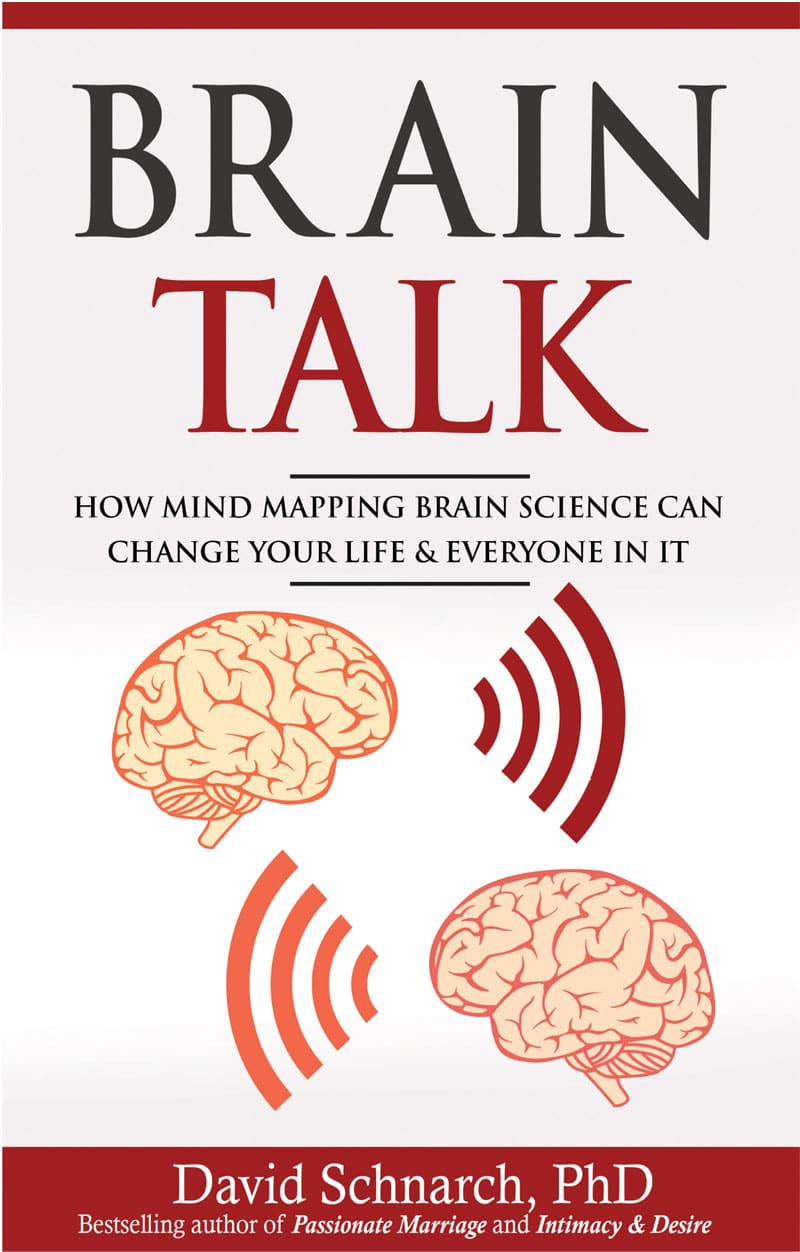Brain Talk offers what you need to know about mind mapping and the emerging brain science of interpersonal neurobiology (how interacting with other people affects your brain). Brain Talk is written for the general public in an easy-to-read style and establishes a personal relationship with you. It creates vivid pictures in your mind with attention-grabbing examples, and walks you into powerful new understandings of yourself and the people who populate your life. Reading Brain Talk can be a life-changing experience!
- Part One explains mind mapping and increases your ability to “read” people and map their minds (and your own). It helps you know what they want, what they are feeling and thinking, and what they are likely to do. Part One also covers mind masking (shielding your mind from being mapped), lying and deception. Brain Talk revolutionizes your understandings of yourself, your spouse or romantic partner, and the other important people in your life.
- Part Two explores the darker aspects of mind mapping, like traumatic mind mapping and antisocial empathy. Traumatic mind mapping occurs when mapping some else’s mind leaves your mind traumatized. Did you grow up in a troubled home with bad experiences that produced vivid “flashbulb memories” that linger in your mind? Do you have recurring thoughts about someone you’re dealing with who does disturbing things? Part Two helps you understand subtle interpersonal trauma. Brain Talk reveals the short- and long-term negative brain impacts of traumatic mind mapping.
- Part Three shows you how to repair the negative impacts of traumatic mind mapping and deal effectively with the difficult people in your life. It also shows you how to use mind mapping to create positive healthy interactions with those you love, and ends on an uplifting note.
Table of Contents
Contents12
Acknowledgments19
Introduction22
Part One: Understanding Mind Mapping31
Chapter 1: What Is Mind Mapping?32
The Driving Wheel of Relationships33
We’re Native-Born Psychologists34
If You Want Great Sex… 35
Everywhere, Everyone, All The Time38
Chapter 2: The Brain Science Behind Mind Mapping39
Theory of Mind39
Mind Mapping Is a Survival Skill41
The Nuts and Bolts of Mind Mapping44
Mind Mapping Shapes Your Life Story48
Mind Mapping Impacts Your Brain51
Chapter 3: Mind Mapping in Children53
Implicit Mind Mapping53
Explicit Mind Mapping54
Enjoy Your Brief Moment of Omniscience56
Four-Year-Olds: Budding Lie Detectors57
Little Lie, Big Moment58
End of Your Privacy59
See The World Through Your Children’s Eyes61
Chapter 4: Does Everyone Have Mind Mapping Ability? 64
Dogs Have Mind-Mapping Ability64
If children and dogs have mind mapping ability, does everyone?67
Parents’ Impact On Children’s Mind-Mapping Abilities68
What if your mother wasn’t mind-minded? 70
What if you come from a troubled home? 76
Where do schizophrenia, autism, and Asperger’s syndrome fit in?79
Mind mapping in children with autism82
Wait! My Husband Has Mind-Mapping Ability?!83
Chapter 5: Mind Mapping in Adult Life86
Mind Mapping in Marriage86
Mind Mapping and Sexual Desire89
Mind Mapping and Sexual Dysfunctions92
Mind Mapping in Affairs94
Singles and Mind Mapping96
There’s a Whole Lot More Going On Than You Thought97
Chapter 6: Mind Masking: Defeating Mind Mapping99
Second Level of Mind-Mapping Ability: Mind Masking99
Why do people mask their minds?100
People from bad homes develop terrific mind–masking ability103
What does it take to mask your mind? 104
Mind masking in adult love relationships105
Third Level of Mind-Mapping Ability: Implanting False Beliefs106
Good therapists need to be good liars107
Fourth Level of Mind-Mapping Ability: Mind Twisting108
Chapter 7: Do You Know Your Own Mind?111
Our Selves Are Connected111
Sources of self-knowledge112
Reflected sense of self113
Perceived Specialness of Introspection115
Fallibility of Introspection116
Distortions in mapping your own mind118
Ways of fooling yourself118
Other People Know You Better Than You Know Yourself120
You Can Be Right About Your Partner But Wrong About Yourself121
Did you marry a complete lunatic? 122
Part Two: Problems of Mind Mapping125
Chapter 8: Traumatic Mind Mapping126
Antisocial Applications of Mind Mapping126
Traumatic Mind Mapping129
Traumatic Mind Mapping Impairs Your Response to Stress132
The closer the relationship, the bigger the impact 139
Traumatic Mind Mapping in Troubled Homes139
Sexual abuse most often occurs through traumatic mind mapping142
PTSD From Traumatic Mind Mapping144
Mind mapping distortions from traumatic mind mapping146
Examples of holes in mind mapping radar149
Anticipatory Traumatic Mind Mapping150
Chapter 9: Antisocial Empathy152
Wrong Notions About Empathy153
What is Antisocial Empathy?155
Schadenfreude: Harm-joy157
Examples of antisocial empathy158
Mirror neurons and embodied knowledge161
How You Can Tell Someone Has Antisocial Empathy163
Studying Who Fails In Therapy166
Disgusting Parenting170
Therapists, teachers and doctors overlook disgusting parenting173
Chapter 10: Impacts of Traumatic Mind Mapping176
Short-Term Impacts of Traumatic Mind Mapping176
Cognitive impairments177
Mind mapping shuts down178
Repeatedly triggered primary emotions180
Impaired emotional functioning181
Mind mapping fails to collapse183
Long-Term Impacts of Repeated Traumatic Mind Mapping184
Steady state regressions186
Impaired disgust reaction187
Cruel mental “voice”191
Hard-wired thought patterns193
Holes in your mind mapping radar194
Autobiographical memory gaps and distortions196
Antisocial empathy199
Being taken hostage200
The Benefits of Seeing Dark Things202
Recovering From “Trump Trauma”203
Diagnosing the country205
Recovering from the presidential election206
Crucible Neurobiological Therapy207
Part Three: Mind Mapping Solutions209
Chapter 11: Detecting Mind Mapping In Others210
Identify Other People’s Mind-Mapping Abilities210
Detecting Mind-Masking Ability214
Discovering deception and lying217
Improving deception detection220
Spotting Someone Playing Three Moves Ahead221
Rule out mind blindness223
Hearing is a large part of mind mapping225
Mind Mapping Isn’t Perfect226
When mind-mapping ability is revealed229
Chapter 12: Reversing Traumatic Mind Mapping232
Visualization and Targeted Mind Mapping235
See the setting237
Watch the movie unfold238
Use a first-person view243
Eye contact isn’t always necessary245
Solutions for Resistant Problems248
Shift to a third-person view249
Envision your child in your position252
Bang Your Head Against the Wall Until the Wall Moves252
Use Your Left Brain to Corner Your Right Brain254
Chapter 13: Repairing Your Autobiographical Memory260
Keep a Person’s Mind-Mapping Abilities in Mind261
Autobiographical memory gaps make this difficult262
Detecting Holes in Your Mind Mapping Radar266
Repair Autobiographical Gaps Through Revisualization268
Mealtime memories are rich resources272
Cross-Reference Memories of Traumatic Events275
Analyze correspondence277
Analyze audio and video recordings281
Have Mental Dialogs With Your Antagonist283
Chapter 14: Dealing with Destructive People289
Dealing With People Who Do Disgusting Things289
Background290
Parents messing with couple’s decision to have a child291
Disclosure of dead brother292
The wedding293
The bachelor party294
Mother295
Father296
Situationally-Accessible Memory (SAM)299
Handling People Who Make Moves on You300
Written mental dialogues301
Decipher your antagonists’ moves302
Concrete steps for dealing with your antagonists304
Show your antagonists you can see them306
Hold On To Yourself (Differentiation)309
Mental dialogue with father310
Make “Gold Standard” Responses312
Don’t let your antagonist get around you313
Another comment brings things to a head317
Email Interactions320
Face-to-Face Meetings324
Keep up with your antagonist in real time325
Look for “news of a difference”328
Did Mother and Father know what they were doing?329
Impacts Ripple Through Dysfunctional Families330
“False memories”331
Post-traumatic Growth332
The moral of the story334
Chapter 15: Create Positive Moments of Meeting335
Positive Moments In Love Relationships336
Give “the gift of mind” to those you love337
Stop masking your mind338
Resolving extramarital affairs338
Deeper intimacy in and out of bed340
Hugging ‘till Relaxed340
Heads on Pillows342
Eyes Open Sex and Orgasms343
Positive Moments With Your Children343
Give your children permission to see you344
Freedom to unmask their minds345
Enter young children’s mental worlds345
Brain-oriented sex education347
Three step repair strategy348
Positive Moments With Friends352
Creating a Healthier Workplace353
Reconnecting With Siblings321
Cherishing Aging Parents357
Let’s Do This!360


